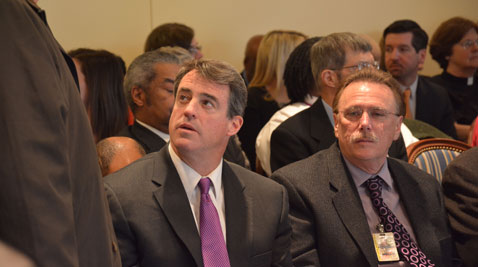ANNAPOLIS – Gubernatorial candidate Attorney General Doug Gansler and his running mate received at least $17,630 toward his campaign fund from individuals and businesses with affiliation to the Attorney General’s Office last year, according to a Capital News Service analysis of reports filed last month with the State Board of Elections.
At least $17,380 of the more than $1.5 million Gansler received in contributions in 2013 — as well as an additional $250 of running mate Delegate Jolene Ivey’s fund — had ties with Gansler’s own office.
Individuals who reported to work for state agencies overseen by the office — including the General Assembly Council, the Criminal Appeals Division and the State Department of Education — contributed at least $4,072 to Gansler’s campaign, though the campaign said that $1,050 of these contributions came from individuals who work in voluntary positions, and are therefore not employed by the Attorney General’s Office.

“Doug [Gansler] has never called his employees and asked them to contribute,” said Katie Hill, a spokeswoman for the campaign. “In prior years he never took donations from his employees while he was running for attorney general or when he was attorney general — in fact, he returned them. He’s running for governor and they work in the Attorney General’s Office, so their livelihoods are not dependent on him.”
Several individuals who work for law firm Skadden, Arps, Slate, Meagher & Flom LLP also donated a combined total of $11,058 to the campaign. The firm’s environmental and climate change practices was previously headed by Ken Berlin, who is now a member of the Attorney General’s Environmental Advisory Council. Similarly, the Law Offices of Stephen J. Nolan, who also serves on the council, contributed $1,250 to the campaign.
The council, however, is a non-statutory, informal volunteer council of advocates, experts and attorneys “who have deep expertise in environmental matters and provide counsel about environmental issues facing the state,” Hill said. Members of this committee are not paid employees of the Attorney General’s Office and “wouldn’t consider themselves to be affiliated with the Office of the Attorney General,” she said.
Gansler also received at least $1,000, and Ivey $250, from businesses and individuals who work for businesses that received funding from the Attorney General’s Office last year, including Sport Chevrolet and the Brown, Goldstein & Levy law firm, according to data published by the State Department of Budget and Management.
While these contributions are legal under Maryland candidacy laws, St. Mary’s College associate political science professor Todd Eberly said the public could see such contributions as improper.
“You always worry that this might be the case of somebody using their influence to solicit funds from those who work for these offices,” Eberly said. “It just adds to a public perception that politics is very much an insiders game — it’s about connections and it’s about who has money and who can do favors for whom.”
Eberly said the solution to the issue would be to prohibit people from contributing to campaigns if they work for the candidate, but that then raises the issue of possibly violating individuals’ First Amendment rights.
“You’d have to worry about their free speech right,” he said. “They’re registered voters in the state and they’re contributing to a candidate that they prefer.”
Jennifer Bevan-Dangel, executive director of Common Cause Maryland, also noted that the issue of free speech infringement makes it difficult to keep individuals from making such donations, but still she thinks something should be done about it in the legislature.
“An entity doing business with office should have greater prohibitions on their ability to donate,” Bevan-Dangel said. “Election years are a good opportunity to see what’s working and what isn’t; this year we’re seeing what isn’t and hopefully the legislature will come back next year and say, ‘How can we tighten up these loopholes?’”
On a broader perspective, Gansler received $263,401 — more than 17 percent of his contributions — from individuals who reported to the State Board of Elections that they work in a “legal” occupation and at least $55,170 from law firms.
These legal contributions aren’t unique to Gansler, however.
Lt. Gov. Anthony Brown’s gubernatorial campaign received at least $422,508 — more than 10 percent of his contributions — from individuals who reported they work in a legal field, such as attorneys and partners in law firms, and at least $42,314 from various law firms. Delegate Heather Mizeur’s gubernatorial campaign received $36,685 — more than 11 percent of her total contributions, not including the matching donations she receives from the state — from individuals in the legal field, though she received no contributions from law firms.
Justin Schall, Brown’s campaign manager, said: “Lt. Gov. Anthony Brown received over 6,000 contributions from every county in Maryland, and he is very grateful for all of his support. …. The legal profession makes up a vital sector of the Maryland economy and we’re proud of their support.”
Mizeur’s campaign declined to comment.
Brown and his running mate, Howard County Executive Ken Ulman, lead Democratic rivals in fundraising, reporting $5.4 million donations in 2013. Gansler and Ivey raised $1.6 million, and Mizeur and her running mate, Delman Coates, raised $1.1 million. The primary election is June 24.


You must be logged in to post a comment.